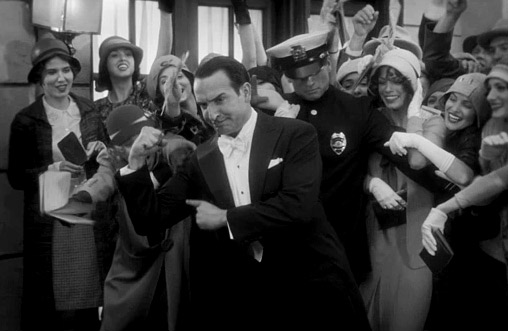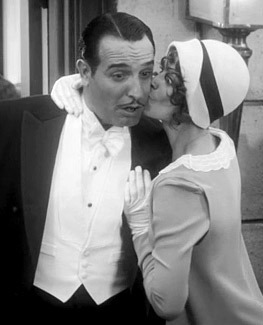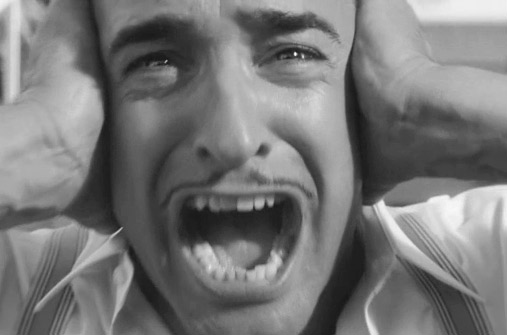The orchestra swells immediately. The retro credits practically shout the glory of the talent "MICHEL HAZANAVICIUS!", JEAN DUJARDIN!" "BERENICE BEJO!" (exclamation points ours -ed.) but the first telling words on the screen in The Artist are actually wittily posted on a sign, urging everyone to keep their mouths shut.
Please Be Silent Behind The Screen."
 George Valentin shows off at his big premiere
George Valentin shows off at his big premiere
We are at the premiere of A Russian Affair, the latest from silent film star George Valentin (Cannes Best Actor winner Jean Dujardin) as he paces behind the screen waiting for the film to end. You can feel the tension as he waits for the audience reaction. The score drops out completely and we hear... nothing (Tension!). Then comes the audience's thunderous applause (Relief!) ... but we still hear nothing. This punchline in the absence of sound gives The Artist its first huge and knowing release of laughter. We can't hear the applause but we sure can see it in the joyous smile spreading across the star's face. That smile is already mirrored and multiplied by anyone watching this new gem.
 George meets PeppyThe push and pull between what we expect to hear or see, and what comes instead is one of the great and consistent punchline joys of this silent film about silent films. Again and again the writer/director and his excellent cast (led with infectious verve by the Oscar-worthy Dujardin) will surprise and move us. Sometimes the magic comes through an unexpected camera movement or destination and sometimes through the physicality of the actors themselves and often by both at once. The laughs even come through sound -- though never in conventional ways; The Artist is, from start to finish, an exuberantly inventive homage to the movies such as they were and such as they are.
George meets PeppyThe push and pull between what we expect to hear or see, and what comes instead is one of the great and consistent punchline joys of this silent film about silent films. Again and again the writer/director and his excellent cast (led with infectious verve by the Oscar-worthy Dujardin) will surprise and move us. Sometimes the magic comes through an unexpected camera movement or destination and sometimes through the physicality of the actors themselves and often by both at once. The laughs even come through sound -- though never in conventional ways; The Artist is, from start to finish, an exuberantly inventive homage to the movies such as they were and such as they are.
The story is both charmingly dated, and blissfully universal, which is to say contemporary; technology and tastes will always evolve and change and disrupt the status quo. George Valentin has the world at his (happy) feet in 1927 when the movie begins but by the time the 1929 title card arrives, he's already a dinosaur. He just didn't feel the asteroid's impact and hasn't yet felt the chill. Valentin laughs off his co-star's (Missi Pyle doing an intentional riff on Lina Lamont) sound test even though his director (John Goodman) warns him...
That's the future."
The future arrives, as it always does, through doors opened by the past. In 1927 Valentin gives a leg up to a complete nobody Peppy Miller (Bérénice Bejo madly winking and, well, peppy, filmed at 20 frames a second) by giving her a big fannish paparazzi moment. She makes the most of this flashbulb spotlight and lands a part in his next film A German Affair . In one of the film's funniest sequences, which sneakily lays dramatic foundation for the second act, we see them do several takes of an inconsequential dancing scene together. I won't spoil the many joys of the unfolding plot but let it suffice to say that it fondly recalls all rise and fall and pick yourself back up showbiz narratives particularly A Star is Born as Peppy's star rises (she's the new "it girl" in talkies) just as Valentin's falls.
 The future is coming
The future is coming
Though the film organically veers towards the sentimental in its second half, it has built such comic goodwill and affection that you don't mind laughing less as George's decline takes the film toward its heaviest dramatic moments. The Artist even risks the maudlin as Valentin keeps uncovering new rock bottoms but there's a beautiful simplicity in its heartbreak imagery. In one scene the once great star stands in front of a projector in his lonely home berating himself for being "stupid and proud"; he's now just a shadow on a smallish screen. Hazanivicious, to his credit, never stops blissfully and obviously cribbing from the best of Old Hollywood like Orson Welles, A Star is Born, Sunset Blvd., and Asta. Regarding the latter, The Artist's not so secret weapon iis its star dog "Uggy" -- a constant companion to Valentin -- who could be a direct descendant from that famous screwball comedy terrier. Best of all, Hazanavicius never settles for just one mood, usually gifting the images and scenes with multiple feelings. To cite but one example, there's a shot that highlights Valentin's disintegrating marraige to Doris (Penelope Anne Miller) which shows you three Valentin's: on the wall hangs a deified Valentin in oil portraiture, standing in front of him is Valentin the actual man realizing his wife is leaving him while holding a defaced photo of his movie star self in his hands (his wife has been scribbling on his headshot). Isn't that the archetypal private life of a celebrity actor in a nutshell?
The Artist in concept could have been a mere spoof, or a pleasant but insubstantial comic homage but Hazanavicius and his gifted team never settle, always reaching for bigger laughs, and delivering unexpected and immensely clever mise en scène. The actors are magicians, themselves. Despite the constant literal winking, as befits the era, they never figuratively wink at the material, which would take you outside of it. It's a movie of sincere and not ironic pleasure.
A retroactive time-travelling note to all selection committees of "future" film festivals in 2011: Always schedule The Artist as your Closing Night movie. It's an impossible act to follow and it'll send your audiences off with hearts soaring. They're return with pleasure the following year eager to see what you've programmed for them. When the movie opens in theaters they'll be returning, too. A
 Jean DuJardin and "Uggy", a match made in heaven.
Jean DuJardin and "Uggy", a match made in heaven.
Re: the Oscars
The Artist is the best kind of Oscar contender in that it never once feels like it was built to hook the Academy, but it will surely prove irresistibly delicious bait nonetheless. Expect nominations across the board for what will surely be one of our Best Picture contenders. It's the only film this season aside from Martin Scorsese's Hugo that's so deeply infatuated with the history of the movies themselves, the very thing that the Academy was built to chronicle.